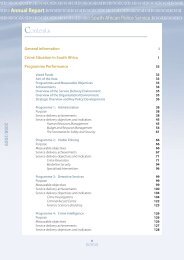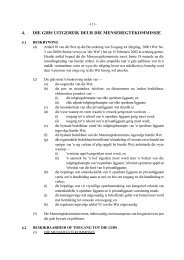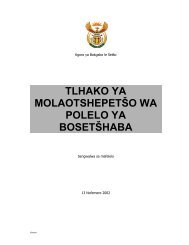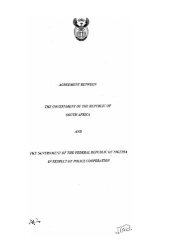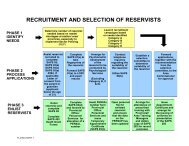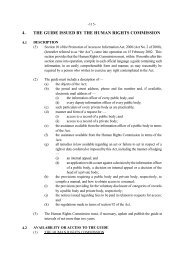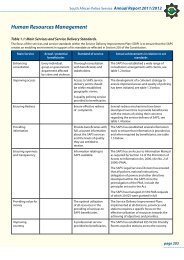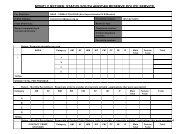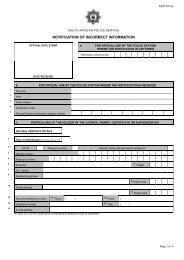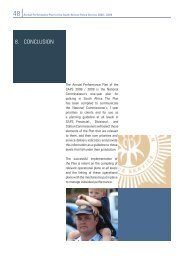Part 13 - Saps
Part 13 - Saps
Part 13 - Saps
You also want an ePaper? Increase the reach of your titles
YUMPU automatically turns print PDFs into web optimized ePapers that Google loves.
321<br />
in close cooperation with the SAPS over a six year period. In terms of the withdrawal<br />
process the commandos will withdraw first from the country’s urban areas, followed by the<br />
rural areas. At the time of writing an inter-departmental task team (including the SANDF<br />
and SAPS) had been established to plan the phasing out of the commandos and design the<br />
structures which will replace the commandos – especially in the rural areas. 40<br />
In terms of the SAPS’ planning at the time of writing, the police intends launching two<br />
initiatives in respect of rural safety which are intended to replace the commandos:<br />
Area Crime Combating Units.<br />
The intention is that one Crime Combating Unit should be established in each of the 43<br />
police areas in the country. The basis of the Units will be the present Public Order Police<br />
Units, strengthened by other relevant SAPS units such as the police air-wing. The Crime<br />
Combating Units will primarily be reactive in nature, by having a rapid response capability<br />
and the capacity to conduct follow-up operations after an incident (such as a farm attack)<br />
has happened. 41 One of the aims of the Crime Combating Units will be to ensure the rapid<br />
stabilisation of an area. Thereafter other role players, such as visible police officers, police<br />
patrols, and officers tasked with developing crime prevention initiatives, are supposed to<br />
put the necessary plans in place for longer-term stabilisation and normalisation of the<br />
crime situation.<br />
Sector Policing.<br />
Sector policing entails the division of a police station area into manageable geographic<br />
areas or sectors, ideally numbering between five and eight. Police personnel are allocated<br />
to every sector on a dedicated basis to enable them to become familiar with the terrain of<br />
‘their’ sector and the people who live and work there.<br />
In a rural context sector police personnel are responsible for mobilising and organising the<br />
rural communities in ‘their’ sectors. Sector police officers are further supposed to create<br />
‘sector crime forums’ where such officers in conjunction with community members can<br />
discuss security related issues affecting their area and identify solutions to local security<br />
related problems. These will be similar to the existing Community Policing Forums.<br />
Communities will be able to hold sector police officers accountable via their sector crime<br />
forums.<br />
Sector policing takes a preventative approach to crime, as opposed to the reactive approach<br />
of the aforementioned Crime Combating Units. Through the close interaction with the<br />
public, sector police officers are expected to identify the underlying causes of crime in<br />
their sectors. In this way some crimes should be preventable before they occur. Where<br />
necessary, sector police officers will be able to call on their station to provide assistance<br />
with, for example, a high visibility police operation.<br />
40 Statement by Vice Admiral H.J.M. Trainer, Chief of Corporate Staff of the SANDF, at a roundtable<br />
discussion held on the phasing out of the Commando system at the Institute for Security Studies,<br />
Pretoria, 5 March 2003.<br />
41 Statement by Assistant Commissioner F.J. Burger, Head of Operational Coordination of the SAPS, at a<br />
roundtable discussion held on the phasing out of the Commando system at the Institute for Security<br />
Studies, Pretoria, 5 March 2003.



